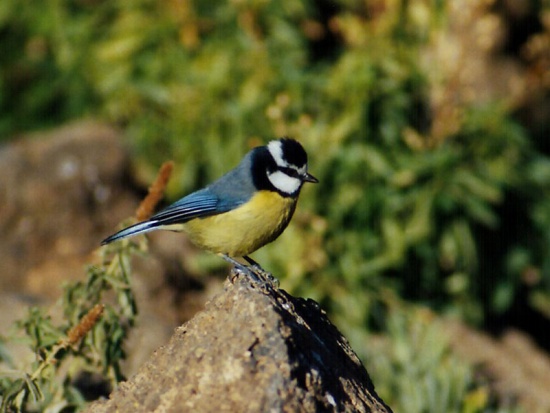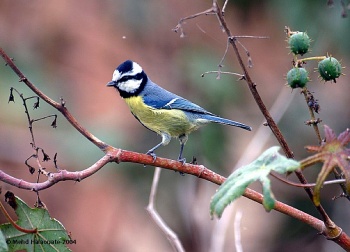Alternative name: Canary Islands Blue Tit
- Cyanistes teneriffae
Parus teneriffae
Identification
11–12 cm (4¼-4¾ in)
- Blue back, nape, and tail
- Dark blue-black eyestripe and crown
- Wings deep greyish blue, with or without a white wingbar
- White cheeks and forehead
- Yellow underparts with dark line down the abdomen
Similar species
Blue Tit differs mainly in paler plumage overall.
Regional variation
Populations in western Canary Islands show a narrower wing bar and those in central Canary Islands lack a wing-bar entirely, while subspecies C. t. degener on the eastern Canary Islands has broad white wing-bars, as broad as or broader than north African C. t. ultramarinus.
Distribution
The North African Blue Tit C. t. ultramarinus occur from sea level to 2100 m in the Atlas mountain range of Morocco and Tunisia. Some vagrant birds in winter can easily reach the latitude of 28 dg N in southern contry oasis. C. t. cyrenaicae is found in Libya, while C. t. palmensis, C. t. teneriffae, C. t. ombriosus, and C. t. degener are found in different islands of the Canary Islands.
Taxonomy
In the past, the genus Cyanistes was included in a broad view of the genus Parus.
Subspecies
Some authors have treated virtually every one of the subspecies listed below as independent full species. Certain other authorities, principally older works up to and including the Howard & Moore 2003 edition, treat the African Blue Tit as several subspecies under Blue Tit Cyanistes caeruleus.
There are 7 subspecies[1]:
- C. t. ultramarinus:
- C. t. cyrenaicae:
- Cyrenia, Libya
- C. t. palmensis:
- Canary Islands (La Palma)
- C. t. teneriffae:
- Canary Islands (Gomera and Tenerife)
- C. t. hedwigae:
- C. t. ombriosus:
- Canary Islands (Hierro)
- C. t. degener:
- Eastern Canary Islands (Fuerteventura and Lanzarote)
Some authorities treat C. t. degener as synonymous with C. t. ultramarinus.
Habitat
Deciduous and mixed woodlands.
Behaviour
Breeding
It builds a nest from moss, wool, hair and feathers, and 7-8 eggs are laid in April or May.
Diet
Their diet is not well recorded, but presumably similar to Eurasian Blue Tit, typically seeds, insects and nuts.
References
- Clements, J. F., T. S. Schulenberg, M. J. Iliff, D. Roberson, T. A. Fredericks, B. L. Sullivan, and C. L. Wood. 2015. The eBird/Clements checklist of birds of the world: v2015, with updates to August 2015. Downloaded from http://www.birds.cornell.edu/clementschecklist/download/
- Posts #97 and 98 in this BirdForum thread discuss African Blue Tit
- Wikipedia
- Handbook of the Birds of the World Alive (retrieved November 2014)
Recommended Citation
- BirdForum Opus contributors. (2025) African Blue Tit. In: BirdForum, the forum for wild birds and birding. Retrieved 15 May 2025 from https://www.birdforum.net/opus/African_Blue_Tit
External Links
GSearch checked for 2020 platform.







